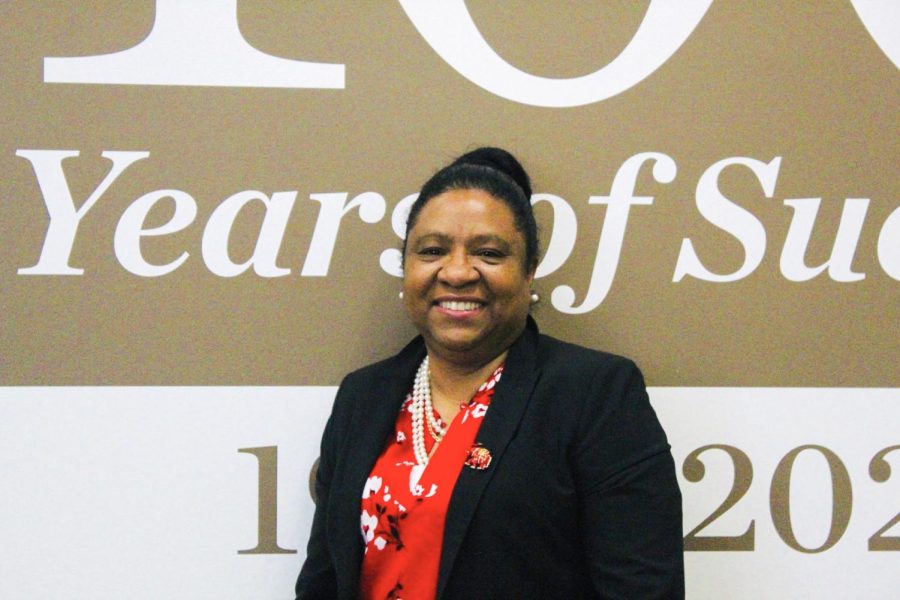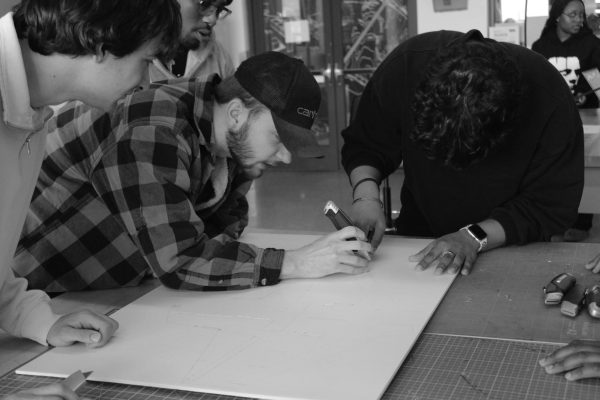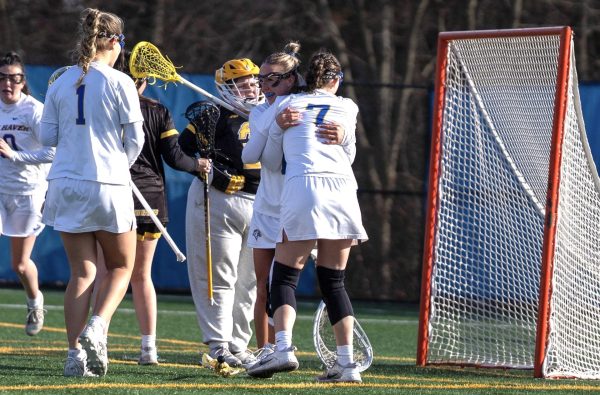Ophelie Rowe-Allen named new Vice President of Student Affairs
Photo courtesy of Charger Bulletin/Charlotte Bassett.
Rowe-Allen poses in the Alumni Lounge, West Haven, April 5, 2023.
To many college students, the dean of students is the one person you want to avoid; a meeting with them must spell the end of your collegiate career, after all.
However, University of New Haven students can rest assured that Ophelie Rowe-Allen, dean of students, chief diversity officer and newly announced vice president of student affairs (VPSA), is not the stereotypical “big, bad wolf.” As a student, she didn’t know what she wanted to do with her life right away, just like so many of us. As a professional, she concentrates on effective time management. As a person, she cares deeply about the success and wellness of her students.
“My care is to make sure that and hoping that they [students] feel a sense of belonging on campus, they feel that they are included,” said Rowe-Allen. “They know that they can be successful and they know that if they need someone to talk to that I am here.”
Ophelie Rowe-Allen began her undergraduate career at St. Thomas University in Miami as an international student studying sociology. She quickly transitioned to the psychology department, where she began studying and understanding the effects of mental health on colleagues, family members and members of her college campus. As an undergraduate student, Rowe-Allen was heavily involved across campus as a resident assistant, research assistant and a leader in the psychology honor society which helped her become more connected to student life and affairs.
Through the guidance of her professors and peers, Rowe-Allen advanced to graduate school and applied to St. Thomas’ Masters of Science Mental Health Counseling/Counselor program. During her time as a graduate student, she became involved at a college counseling site for internship experience, saying, “While I was there, I started seeing how much college students [and] what they were going through.”
Rowe-Allen transferred her understanding of the shared experiences and struggles that most college students endure to her position at Fairfield University as associate dean of students and director of residence life. During her 14 years at Fairfield, she applied different initiatives and learning development programs to student residential living. At the end of her career at Fairfield, her aspirations to transform the dean of students position from a conduct-related task to a development-oriented role evolved at the start of her tenure at the University of New Haven.
“One of the things I wanted to do is to change how students look at the dean of students office,” said Rowe-Allen. “Because the dean of students is if you get in trouble. So I wanted to change it to the dean of students; where they see the office as they could come. It does not matter what they want, what they want to talk about. This was the place that they could just come into.”
When stepping into her role at the university, Rowe-Allen said she had to evaluate herself and see the contributions she could make to the community, with one of those contributions being mentorship.
“That was important to me in terms of making sure that mentoring and wellness is something that is at the forefront for me in helping students… and not just mentoring for students, but also mentoring for staff,” Rowe-Allen said.
Much like her undergraduate career, Rowe-Allen continues to possess various titles at the university on a professional level. As the dean of students, she has centered policies at New Haven around the self-development of students while she targets community development as the chief diversity officer.
Rowe-Allen discusses the importance of community development in the academic journey of underrepresented student populations, saying, “There are students that celebrate different kinds of traditions and rituals on this campus, right. And so are we celebrating that with them or are they celebrating it alone?”
She further spoke on how the differences in the student population should be embraced and discussed as part of creating a better understanding for topics of race, social class, spirituality, gender, sexuality and ethnicity. Rowe-Allen’s regularly sent emails are an initiative to keep the campus community informed, to which she said, “I will send out [emails] when it’s Ramadan, when it’s Passover [and] when it’s Lent. Outside of this, people will not think of that. Because it seems very individualistic, we need to see this as a community. Coming together, to say there are different people in our community. Not just by skin color, but it is beyond that. And so how do we embrace them to let them know that we stand in solidarity with them.”
On March 1, Chancellor Steven Kaplan announced Rowe-Allen’s promotion to VPSA. When comparing her different positions, she explained the differences between the objectives of strategic planning versus development.
“Within higher ed, when you have the combined positions of dean of students and vice president of student affairs, it overlaps,” Rowe-Allen said. “The VP position is really more of strategic planning: ‘What are the key priorities that you are going to be developing and what is the assessment plan that’s going to be happening?’ For the dean of students position, it is mostly what are the policies: ‘we need to look at these things, right, and here are the things that will be done.’ But from a strategic level, the VP has to have that lens of looking at ‘how’ the community and students are changing.”
Rowe-Allen expanded her role as VSPA to include a wellness outlook outside of counseling for students. “We have been sending out the wellness newsletter because we realized some of the things [that] were happening: students weren’t going to class,” she said. “We wanted to let them know how important that is. So we were like, ‘what resources do we need to provide?’ And we realized that we needed to expand that more.”
Throughout the wellness newsletter email campaign, the student responses collected by the dean of students office enabled individualized wellness plans for students facing different struggles related to mental health, financial circumstances and other disparities.
“It was a team effort where you have the center for student success. You have Dr. [Tiffany] Hesser in the Provost Office,” said Rowe-Allen. “And I have a case management team here that really looks at: ‘Okay, how are we going to help this student?’ To make sure, can this student survive the rest of the semester or not?”
And if there is one thing Rowe-Allen wants everyone to know about her, it’s that she never wants to be seen without a smile on her face. Likewise, she will do everything in her power and more to ensure students enjoy a collegiate experience predicated on inclusivity, understanding, health and prosperity.










